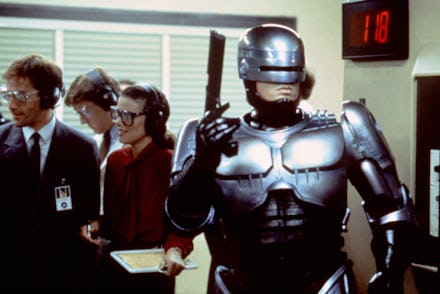6 sci-fi movies that capture 2020's mundane horror

In the early weeks of the pandemic, it was common to see media consumers turn to the 2011 film Contagion or Ling Ma’s Severance as handy explainers for what lies ahead. Their prescience has felt both eerily on-the-nose and almost too competent when contrasted with the ineptitude at all levels of governance. I saw someone say that in order for disaster movies to actually reflect our pandemic response, there’d need to be a collapse in mass solidarity as the Meteor Culture Wars rage on.
This temptation to find answers through art will never go away, and some of them will feel inadequate compared to the uniquely American sadism on display in response to COVID-19. Sci-fi films have always had a mixed-to-decent track record when it comes to imagining the future. (2001: A Space Odyssey’s prediction of video chat? Back to the Future Part II’s Cubs World Series forecast? Not far off.) As we perpetually adjust to society that in many ways would’ve looked unrecognizable just six months ago, it’s a good excuse to stream the best sci-fi movies that predicted 2020’s mundane dystopia.
Robocop (Starz)
Over at the New Yorker, David Roth wrote an incredible piece about how Paul Verhoeven’s Starship Troopers is the defining emblem of this presidency and moment. I think when I saw Verhoeven’s Robocop for the first time, I was too young and dumb and rejected it in the aftermath of Birdman and Deadpool brain poisoning — no no no, this is too on-the-nose. Turns out that was very much not the case! Andrew Cuomo's digital billboards encouraging safe pandemic practices after preceding over 30,000 deaths in his state — followed by championing the mountain poster as a trophy. The damn Ivanka Trump Goya beans photo! Everything is garish and grotesque and decaying and no '80s sci-fi could be too direct about anticipating that.
Her (Netflix)
There were some amusing memes during the great Joker panic of 2019 about how Her is actually the Joaquin Phoenix incel movie. Luckily, it came out during a time when being a Chad meant nothing more than the singer of Nickelback, so Spike Jonze’s affecting drama could be understood on very different terms. Prescient long before the pandemic struck, the film would come to forecast a specific kind of post-internet loneliness and alienation, along with the impermanence and ephemeral nature of the relationships we form on there. With at least an entire year of diminished in-person interactions guaranteed at this point, it’s hard to imagine these themes becoming any less resonant.
Seconds (Criterion Channel)
One of my favorite recent watches on the Criterion Channel, this paranoid John Frankenheimer drama is in many ways an excellent Twilight Zone episode...but also something that could never make it onto network TV in any era. Led by Rock Hudson, the 1966 mind-bender is crushingly sad, focusing on an aging banker who’s given a chance to restart his life through a shadowy company. It arrives at some dispiriting thematic conclusions — no matter how many reboots and second chances its protagonist attempts, life is still dehumanizing — and that the moneyed class will be the only ones to truly access those opportunities. This thing also sports some of the best cinematography ever put to film, courtesy of James Wong Howe, which still feels remarkably fresh today.
Minority Report (Netflix)
After a summer of reckoning with racialized police violence, it’s led to a significant examination of police resources. Why does every city in America need to have tanks? Tear gas? Sonic cannons? Besides the sheer breadth of resources, it barely scratches the surface of the police surveillance state. Adapting a Philip K. Dick short story, Steven Spielberg lucked into arguably the first post-9/11 blockbuster to confront our overzealous, preemptive approach to policing at home and abroad. If PreCrime seemed sensational at the time, its methods feel almost quaint compared to reality.
12 Monkeys (HBO)
You may notice that I’ve declined to include the obvious pandemic choices — Contagion and Outbreak in favor of the one that actually feels worse than our current outlook by comparison. A dark, twisty, futuristic noir from Terry Gilliam, 12 Monkeys imagines a virus that takes out a large bulk of humanity. Much like how the pandemic feels all-consuming in the moment but will easily be dwarfed by the carnage of climate change, Brad Pitt’s Jeffrey Goines is onboard in the effort to time-travel and halt the virus, while knowing what other dangers lie ahead once that's prevented. Feels great!
Edge of Tomorrow (Rent on VOD)
Another Cruise sci-fi actioner, except this time it’s actually set in 2020. Edge of Tomorrow remains my favorite of the post-Groundhog Day time loopers. So yes — it didn’t quite nail the particulars of this worldwide crisis (alien warfare instead of global pandemic,) but much like many before me have said about Palm Springs, it captures the banal repetitiveness of living right now. The stakes are significantly higher — and Doug Liman’s command of hilarious deaths stronger — to make this another late-career action highlight for Cruise. Much like the leaders shepherding us into oblivion, his Major Cage begins woefully unprepared to handle the crisis. But in a break from reality, he learns.